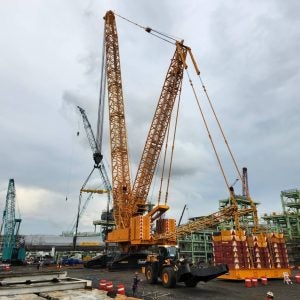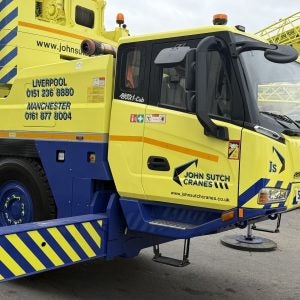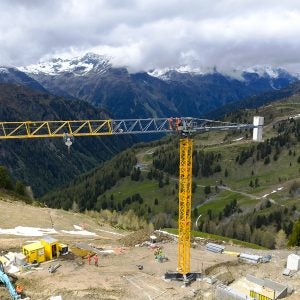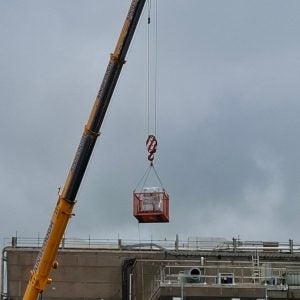As managing director of Liebherr Great Britain, Richard Everist oversees sales and service on cranes manufactured at its German-based factories, Ehingen (mobiles and crawlers) and Biberach (towers), and at Nenzing (harbour mobiles and crawlers) in Austria.
It’s been six months—he started on 1 May—since Richard Everist replaced retiring David Milne. Everist was previously MD of HMF UK, a wholly owned subsidiary of Danish multinational HMF, which makes lorry loader cranes.
It is fitting that Everist’s new focus is on higher capacity lifting equipment. In the yard of the Biggleswade-based facility there’s a range of cranes (the oldest is 12 years old) all traded in by rental companies upgrading their fleets to meet demand for higher capacity lifting equipment. As Everist puts it: “Nobody wants a fleet with only 30% utilization.
“There’s a shift of emphasis from low capacity to large capacity simply because the work that’s out there requires it. There’s an increase in demand in the UK and globally for cranes over 150t. Although orders are less than two years ago, higher capacity cranes are more expensive so the impact is not massive. In mobile cranes, we’re still pretty buoyant and the order book is strong.”
Market conditions are a test of rental firms’ flexibility. Interestingly, it’s not only the big players—Ainscough has bought two 500t CC 2500s, two 600t CC 2800s and a 1,250t CC 6800 from Terex, as well as a 600t LR 1600/2 from Liebherr—who can adapt.
“We’re selling large cranes to relatively small companies; it doesn’t have to be 50–100 strong fleets to evolve. Some companies look at enduser markets and note where demand is. We find customers who’ve found niches. A recent example was a rental firm with less than 20 cranes in its fleet who we sold a 1,200t capacity crane.”
Many of these projects were committed before the market dipped and are likely to demonstrate immunity to economic pressures. “Of course, energy isn’t going to be in recession,” says Everist. But he believes the rest of the business (tower cranes and low capacity mobiles) might stay there for a long time to come yet.
“A consequence of the boom was that people would buy everything without regard and there’s a lot of kit washing around the UK and worldwide markets. It won’t be the beginning or even end of next year before we see an increase in demand. Demand won’t outstrip supply for a long time.
“Why would people buy new cranes when there’s somuch idle stock out there?
“It’s the first time really that there’s been such a global recession. As such, used cranes are difficult to shift. Previously, there were always markets waiting, whether it is India, China, Eastern Europe, or even South America.”
Frank Bardonaro, president and COO of USA rental firm AmQuip, said recently in Cranes Today that “manufacturers all got greedy and made too many cranes too fast.”
“I read that article,” says Everist, “and I don’t agree. What do you expect manufacturers to do? They made cranes in response to orders and demand. Liebherr didn’t make cranes for stock.
“We don’t have a problem maintaining relationships with rental firms. Ongoing service is critically important to them. In most cases, cranes are their main business so it’s about maintaining uptime of cranes on the road; making sure they’re earning money.”
However you look at it, times are tough. “You have to support the bits of your business that are performing badly with those that are doing well. Liebherr is a strong company with a diverse product range capable of doing that.”
It’s this diversity that attracted Everist to the company, as well as the simple truths that it is a “bigger company” with a “significantly bigger UK operation” and the move represents “career advancement”.
“There are similarities. Both are family run companies focused on strength and stability, as opposed to shareholder drives. There aren’t many tiers of management.
“For each product line there is a factory, with a commercial and technical operation. These dovetail smoothly with the local sales and service operations like Liebherr Great Britain.
“Liebherr is a market leader and has been for some time. Businesses I’ve managed in the past had really low market share and we needed to grow it, especially in UK. They are skills I can use now to grow and develop sales at Liebherr. At HMF it was about finding niches and growing market share.
“It’s a sales management issue. What we’ve had to do is get sales people to change. They’ve lived through bad times in the past and it’s about getting them to change their mindset back. There are rental companies out there who don’t buy Liebherr, for example.”
One route to Liebherr Great Britain headquarters from the Cranes Today office takes you beside the London 2012 Olympic site. There’s a plethora of cranes of all kind on show, ranging in capacity, manufacturer and Rental Company. Similar in variety is Everist’s fleet of crane models, which sit on his window sill. He points out that it’s not a collection he can take credit for himself, having inherited it from David Milne.
“Our customers have got cranes on the site, but it [the Olympics] isn’t going to make a positive difference to business.” He explains: “If the construction of the site was taking place during a boom time, demand would have been greater than rental companies had in their fleets but, fact is, they are just using cranes which would have otherwise been idle.”






